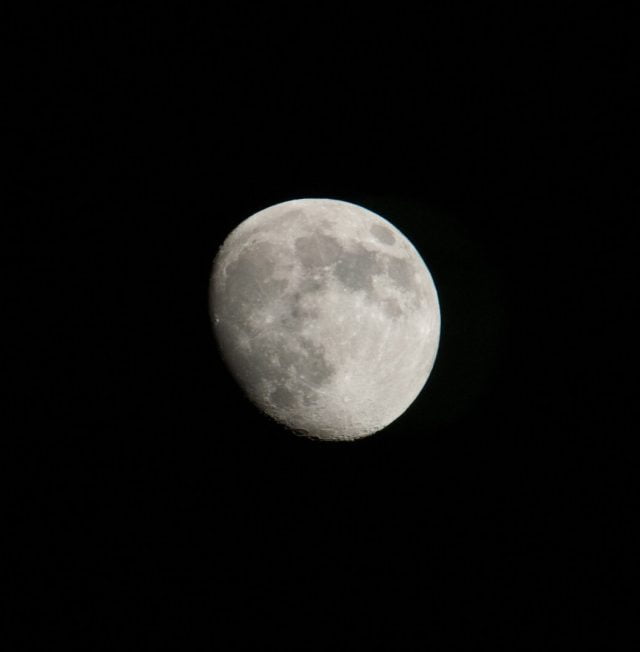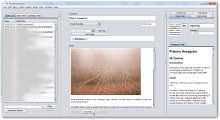Some of the Yi’s most interesting phrases come in threes. The advice not to chase what’s lost, for instance, or ‘not robbers, marital allies’. This is another of those: ‘the moon is almost full’.
‘Already rained, already come to rest.
Hexagram 9, line 6
Honour the power it carries.
The wife’s constancy brings danger,
The moon is almost full.
Noble one sets out to bring order – pitfall.’
‘King Yi marries off the maidens.
Hexagram 54, line 5
The first wife’s sleeves are not as fine as the younger sister’s.
The moon almost full, good fortune.’
‘The moon almost full,
Hexagram 61, line 4
A horse’s yoke-mate runs away.
No mistake.’
What’s the significance of an almost-full moon?
The moon over China
I’ve taken a quick dive into early Chinese ideas about the moon. There was the lunar calendar, of course, but from all I’ve been able to find out, the phases of the moon had no particular astrological significance.
The moon and sun have poetic significance, though. In the Book of Songs, women who are unhappy in love call out to sun and moon, and a man compares his beloved’s beauty to the moon:
‘A moon rising white
Song 143 from The Book of Songs
Is the beauty of my lovely one.
Ah, the tenderness, the grace!
Heart’s pain consumes me.’
There’s also a woman who lives in the moon: Heng E, the beautiful wife of Yi the Archer, stole the elixir of immortality from him and fled to the moon. Yi is the hero who shot at the ten suns when they all came out at once and scorched the earth, so he and his wife are connected with sun and moon. Of our three Yijing lines, two mention wives, and the third a pair of horses.
Let’s look at them one at a time…
9.6
Hexagram 9, Small Taming, starts with the frustration of dark clouds that bring no rain. But by line 6, the rain has finally come – which makes it perhaps a little odd that this line changes to Hexagram 5, Waiting. Yet it does seem to counsel patience:
‘Already rained, already come to rest.
Honour the power it carries.
The wife’s constancy brings danger,
The moon is almost full.
Noble one sets out to bring order – pitfall.’
Now it’s rained, the ground is fertile – the seeds will germinate and grow. (In the garden after rain you can almost hear them stirring and waking.) The ‘moon almost full’ is part of the same atmosphere: nights are getting brighter, energy is on the rise. This is no time for the noble one to set out to war, not least because he needs to stay home and farm.
Why does the wife’s constancy mean danger, though?
An easy solution to this is to revert to the ancient meaning of zhen, ‘constancy’, as ‘divination’. With the yin, moon energy on the rise, the wife’s divination might be especially accurate, and she prognosticates the disaster if the man sets out.
Still… if there were such a thing as ‘wife’s constancy’, what could it be? Constancy means knowing truth and holding to it, carrying something through. And the wife governs the inner space, is the home-maker. So in my 2010 book, I imagined this as dogged persistence in creating and securing your own space. The man setting out to bring order was simply the externalised, male version of the same impulse – and while the wife’s constancy might avoid the pitfall of trying for too much certainty, a military expedition surely wouldn’t.
Only it occurs to me now that the wife’s role is also to bear children. Could this line be saying she’s conceived? Honour the power she carries; the moon is almost full. He really should stay home. And this would make for a strong connection with the zhi gua 5, Waiting.
When the moon is full, it will be fully opposite the sun – they face one another. That creates a strong contrast between 9.6 and 9.3:
‘A cart losing its wheel spokes.
Husband and wife avert their eyes.’
With the moon almost full, this line’s on the verge of that perfect partnershp. Its rising energy has to do with relationship, turning towards one another and coming into alignment – a terrible time for him to turn his face away from the home and set out to war.
54.5
An interesting fact about Hexagram 54: in the Guicang, another ancient hexagram oracle of which only fragments survive, it is still called ‘Marrying Maiden’, and says,
‘Heng E stole it [the elixir of immortality] to flee to the moon. When she was about to go, she had the stalks divined by milfoil by You Huang. You Huang prognosticated them and said: Auspicious. So soaring the returning maiden, alone about to travel westward. Meeting heaven’s dark void; do not tremble, do not fear. Afterwards there will be great prosperity.’
Edward Shaughnessy, Unearthing the Changes
(On arrival, Heng E was transformed into the striped toad, which makes you wonder about You Huang’s refund policy.)
So this hexagram and the moon have history.
Here’s its fifth line:
‘King Yi marries off the maidens.
The first wife’s sleeves are not as fine as the younger sister’s.
The moon almost full, good fortune.’
The younger sister’s finer sleeves are understood to represent her greater fertility: she would become the mother of Fa, the future King Wu. We might say her star is rising; Yi says her moon is waxing. Shang and Zhou are coming into partnership; the Lady of Shen is coming into her own; the Mandate of Heaven is coming a little closer to the Zhou people. The moon is almost facing the sun, but for now, all we have are subtle omens and the sense of future promise. It’s a moment to celebrate what is to come.
61.4
Hexagram 61 is full of pairs and partnerships – the crane and its young in line 2, the counterpart in line 3, and in line 4 a pair of horses:
‘The moon almost full,
A horse’s mate runs away.
No mistake.’
Unlike the previous two lines, this one puts the waxing moon first – emphasising that the light is getting brighter, we’re almost there, on the cusp of alignment and perfect rapport.
And… one of the horses runs away and disappears. (The verb used means ‘flee’ and also ‘disappear, lose, die’.) This certainly seems like a disaster, especially at such a moment, but we’re reassured that it’s not a mistake. Why not?
Line theory has an answer: the fourth line is yin, a ‘pair’ with the other yin line at line 3, but runs away from that one to support the yang fifth line, like someone who follows a higher path. That’s persuasive, but I’d find it even more so if only it said the horse’s mate runs free, or ascends, or finds a new master, instead of just saying that it’s gone.
We’re at the threshold between trigrams, of course, so there’s certainly a sense that line 4 is pulling away from line 3 as the wind moves freely over the lake. This seems to me to have an opening effect. The waxing moon is a time for partnership, but both the vanished horse and the one left behind are open now to new pairings, as free to respond as the mare of Hexagram 2. There’s a great sense in this line of opening up to invite new experience, and maybe even a walk with tigers.
Summing up…
The ‘moon almost full’ becomes a lot more resonant when I realise that it’s the moon almost perfectly opposite the sun, just coming into full relationship with it. The theme is one of rapport, partnership and alignment – in potential, almost there. A time of anticipation, a good time to turn towards one another – or, in Hexagram 61, towards some mysterious new energy out beyond what we know.











(Unrelated comment?) Love all your posts, Hilary. Your work on Yi really stands out. I should really donate some day. Really. (saving up to buy a stove right now) Thank you from Brazil.
Thank you – and I hope you get a really good stove!
Your posts are so helpful and insightful — Thank you!
A very nice read. Thank you.
Just looking at
‘Already rained, already come to rest.
Honour the power it carries.
The wife’s constancy brings danger,
The moon is almost full.
Noble one sets out to bring order – pitfall.’
Hexagram 9, line 6
Kan here is above Qian. It is in the Heavens. Kan being water in motion does include a representation of rain. Kan is also symbolic of the moon. And, of course Kan represents dangers.
This captures quite a bit of the text above.
Does ‘Wife’s constancy’ here refer to a stance of accepting and being passive? When in the last line the reader is instructed to bring order?
I find the ‘already rained’ a little difficult here as it leads to Hx.5 which some folk see as waiting for the rain to stop. (Steve Marshall Mandate of Heaven?).
Waiting for the moon (to be full?).
The Image of Hx. 5 only slightly tampered with.
“Moon rises up to heaven:
The image of WAITING. (For the festival?)
Thus the superior man eats and drinks,
Is joyous and of good cheer.
Sorry if this appears a little impish, it’s SUNday. 🙂
Impishness always welcome 😉 .
True, and yet…
9.6: changing to kan, that’s why it mentions the moon. 54.5: kan before the change, provided you count nuclear trigrams, so that’s why it mentions the moon (according to Wilhelm). 61.4: err… .
I’m pretty sure the text does play with trigrams at times, but Interpreter Beware, I think.
The reader is absolutely not instructed or advised to bring order – on the contrary! Doing so would be disastrous. The noble one needs to stay put, settle down and do some gardening, not go gallivanting off to put the world to rights.
Well, you could always translate ‘already raining’ instead. As for what to make of Hexagram 5, I had some fun looking at the character a while back, and I’m inclined to think Wilhelm had it right all along. To exactly no-one’s surprise.